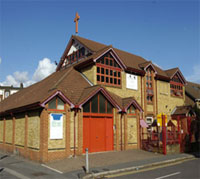
Bishop a convicted criminal over church bells
Attorneys representing a Christian church leader convicted as a criminal for allowing his church bells to ring say they are hoping appellate decisions will overturn the conviction of Bishop Rick Painter and also strike down the Phoenix regulation under which he was convicted, and several other churches now are being threatened.

Bishop Rick Painter, sentenced for allowing church bells to ring |
Senior Legal Counsel Erik Stanley of the Alliance Defense Fund today argued both cases and told WND the prosecution of Painter of Christ the King Liturgical Charismatic Church and the threats against other churches, including St. Mark Roman Catholic Parish and First Christian Church of Phoenix, are unprecedented.
"This case illustrates that no pastor should ever be criminally sentenced for ringing church bells," he said. "This is a huge leap. We are not aware of any historical precedent where someone has been criminally convicted for peacefully exercising his religion. He never should have been convicted for peacefully ringing his church bells."
The cases are separate but related.
The situation developed over the bells at Christ the King, which chimed regularly after 8 a.m. and before 8 p.m. as a way of praising God.
They were measured at 67 decibels while a normal conversation ranges about 60 to 70.
However, Painter was convicted under a Phoenix ordinance that restricts noise levels and includes an exemption for louder sounds from ice cream trucks but not for churches. He was given 10 days in jail, suspended, and three years of probation for his offense. He also was ordered to muffle the bells at his church to no more than 60 decibels for specific brief periods of time.
"Pastors and churches shouldn't be treated as criminals for expressing their faith the way churches have done for centuries," Stanley said. "Being sentenced to jail and probation for ringing church bells is simply ridiculous, especially when the noise level of the chimes is no louder than what the law allows for ice cream trucks."
Phoenix allows those commercial operations to emit sounds up to 70 decibels at a distance of 50 feet, although no allowances are applied to churches.
Then just months after Painter was convicted of ringing the bells, city officials notified St. Mark's that the sound of its bells also could produce charges, and the ADF brought a case to pre-empt the city's noise regulation.
Stanley argued both the civil case in federal court and the appeal in state court of Painter's conviction today.
The ADF explained that the outcome of the two cases "will determine whether city officials will be allowed to enforce the unconstitutionally vague noise ordinance that punishes churches for engaging in religious expression that has been traditionally practiced by the church for centuries."
In the federal claim by the churches, the city of Phoenix was asking that the case be dismissed. In the criminal case in state court, ADF lawyers were asking that the conviction be abandoned. Neither judge issued an immediate ruling.
But WND reported last month on a series of attacks on Christian churches using noise ordinances.

All Nations church, silenced by neighbors' complaints about 'noise' |
The Christian Legal Centre in the U.K. reported a victory in a battle, although the war remains.
The group said was a "last-minute out of court settlement" that will allow a 600-member church in London to continue its worship.
The Lambeth Council previously had issued a noise abatement notice to the All Nations Centre in Kennington which prevented the church from using any amplification for its worship music and its pastor's preaching.
No allowance was made for any of the seniors in the congregation, some of whom have hearing difficulties, officials said.
The noise abatement order was issued last fall without warning or discussion, shortly after the church, which has been in the same location for more than 45 years, began to publicize its services in its own neighborhood.
Onn Sein Kon, case manager at the Christian Legal Centre, said the organization has noticed an increasing number of attacks on churches because someone can hear the worship.
"Regrettably, our case load is increasing with councils issuing noise abatement notices as a means of curtailing or closing churches in London," Kon said."What is really going on here is action by secularists to try and restrict Christian freedom and expression in this country."
Andrea Williams, the director of the legal organization, said the real motivation behind such attacks is "hostility to the Christian message."
"The law is being used as a pretext to harass and silence Christian viewpoints not approved by the state," Williams said. "All Nations Church is simply trying to make Christianity relevant to 21st century Britain and it will be a great loss if the church, which is a great benefit to the community, has to curtail its activities and outreach programs."
"The complaint has nothing to do with the noise and everything to do with our faith," said the senior pastor, Abraham Sackey.
The church, with the help of the Christian Legal Centre, fought the order.
"The church believes that the council's withdrawal is an attempt to conceal what happened and which has been ongoing for some time, not only in Lambeth but nationally. The leaders of the church maintained from the very outset that the notice had nothing to do with noise," Sackey said.
The legal organization said another church, Immanuel House of Worship in London, also has been "silenced" by the government because the sound of its worship drew a complaint from a single Muslim neighbor.
That's despite the fact the neighbor is living in what used to be a church house adjacent to the church itself.
The church in Walthamstow was targeted by a noise abatement order even though local government officials had tested – and approved – its sound mitigation plan.
Ade Ajike, a church trustee, reported that after a visit from a government environmental health officer, the officer warned, "the church had to keep the noise down so as not to offend the Muslims living in the area."
"He told us 'this is a Muslim borough, you have to tread carefully,'" Ajike reported about the 2009 dispute.
The church has since reduced its Sunday worship from four hours to two hours and 30 minutes, of which music is played for only about 45 minutes. Midweek services were changed so that no music was used, and Sunday evening services were reduced to one a month.
The church further eliminated the use of percussion from its worship.
That church's case continues on appeal.
The Christian organization called Barnabas Aid also is reporting similar tactics are appearing in Africa.
"The government of Senegal has recently launched a campaign to close down a number of churches, on the grounds that their services are too noisy. Congregations that do not own their own premises are being targeted. Several have had their public worship suspended, and others are under threat," the ministry report said.
It reported in Dakar, three churches were closed and some musical instruments were confiscated. In one church the police threatened leaders with arrest if they did not stop holding services of worship and prayer in their sanctuary, the organization reported, because a Muslim neighbor, "unhappy at having Christians worshipping next door to her home," complained to the mayor's office that the church was making too much noise.

